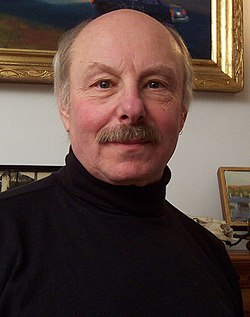James Howard Kunstler Quote
Parallel parking is desirable for two reasons: parked cars create a physical barrier and psychological buffer that protects pedestrians on the sidewalk from moving vehicles; and a rich supply of parallel parking can eliminate the need for parking lots, which are extremely destructive of the civic fabric.
James Howard Kunstler
Parallel parking is desirable for two reasons: parked cars create a physical barrier and psychological buffer that protects pedestrians on the sidewalk from moving vehicles; and a rich supply of parallel parking can eliminate the need for parking lots, which are extremely destructive of the civic fabric.
Related Quotes
Ever since I was young I enjoyed solving puzzles and having the pleasure to see the bigger picture afterwards. But even after all that, I found that life could be the most challenging puzzle we have t...
Virgil Kalyana Mittata Iordache
Tags:
bigger, borders, building, center, challenge, challenging, comfort, corners, difficulty, enjoy
There may be something going on in your life right now, that seems like a giant, so big that you think it's impossible to conquer. But, remember no matter how gigantic your problems may be, you have e...
Amaka Imani Nkosazana
Tags:
activation, dedication, education, everything, faith, focus, happenings, happiness, healing, honesty
If real, regular, normal, boring life, (when you're at home every day, seeing the same people, doing the same things) is like sitting at home on the floor surrounded by toys... traveling feels to me l...
Alex Day
Tags:
change, change your life, changes, changing, explore, exploring, fresh, fresh ideas, fresh life, ideas
About James Howard Kunstler
James Howard Kunstler is an American writer, social critic, public speaker, and blogger known for his analysis of urban development, suburbanization, and energy issues. Born in New York City to Jewish parents, he gained prominence through his non-fiction works critiquing American suburban development and predicting societal changes based on resource constraints. His most influential books include The Geography of Nowhere (1993) and Home from nowhere (1996), a critical examination of American suburbia and urban planning, The Long Emergency (2005) and Too Much Magic (2012), which explore the potential consequences of peak oil and energy depletion on modern civilization and humanity's over-reliance on technology to solve problems. Kunstler's work has become standard reading in architecture and urban planning courses, and he has been a prominent spokesperson for the New Urbanism movement.
Throughout his career, Kunstler has authored both fiction and non-fiction works, including a series of post-apocalyptic novels beginning with World Made by Hand (2008) that envision a future of localized, low-energy communities. As a journalist, he has written for major publications including The Atlantic, Rolling Stone, and The New York Times. His political views have evolved significantly over time, transitioning from harsh criticism of conservative politics to more recent support for certain conservative positions and skepticism of mainstream Democratic policies. While his peak oil predictions proved premature due to technological developments like fracking, Kunstler continues to advocate for sustainable urban planning, improved rail infrastructure, and preparation for what he sees as inevitable resource constraints, maintaining his influence through writing, speaking engagements, and online commentary.
Throughout his career, Kunstler has authored both fiction and non-fiction works, including a series of post-apocalyptic novels beginning with World Made by Hand (2008) that envision a future of localized, low-energy communities. As a journalist, he has written for major publications including The Atlantic, Rolling Stone, and The New York Times. His political views have evolved significantly over time, transitioning from harsh criticism of conservative politics to more recent support for certain conservative positions and skepticism of mainstream Democratic policies. While his peak oil predictions proved premature due to technological developments like fracking, Kunstler continues to advocate for sustainable urban planning, improved rail infrastructure, and preparation for what he sees as inevitable resource constraints, maintaining his influence through writing, speaking engagements, and online commentary.
